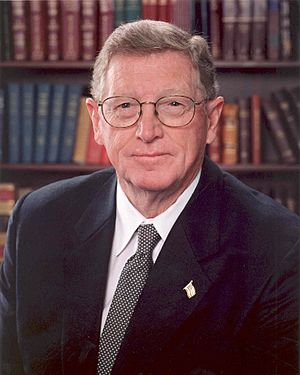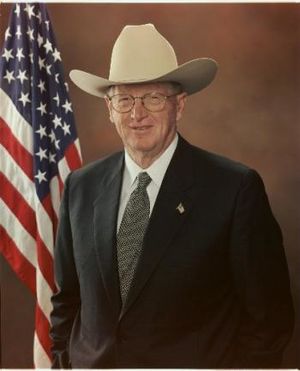Conrad Burns facts for kids
Quick facts for kids
Conrad Burns
|
|
|---|---|
 |
|
| United States Senator from Montana |
|
| In office January 3, 1989 – January 3, 2007 |
|
| Preceded by | John Melcher |
| Succeeded by | Jon Tester |
| Personal details | |
| Born |
Conrad Ray Burns
January 25, 1935 Gallatin, Missouri, U.S. |
| Died | April 28, 2016 (aged 81) Billings, Montana, U.S. |
| Political party | Republican |
| Spouse | Phyllis Kuhlmann |
| Children | 3 |
| Education | University of Missouri (attended) |
| Military service | |
| Allegiance | |
| Branch/service | |
| Years of service | 1955–1957 |
Conrad Ray Burns (January 25, 1935 – April 28, 2016) was an American politician. He served as a United States Senator from Montana and later worked as a lobbyist. He was only the second Republican to be chosen by the people to represent Montana in the Senate. He was also the longest-serving Republican senator in Montana's history.
While in the Senate, Burns was part of the Senate Appropriations Committee. He led its Subcommittee on the Interior. He also chaired the Commerce, Science, and Transportation Committee's Communications subcommittee.
Contents
Early Life and Career
Burns was born on a farm near Gallatin, Missouri. He finished high school in 1952 and then went to the College of Agriculture at the University of Missouri. In 1955, he left college and joined the Marine Corps. He served in Japan and Korea as a small-arms instructor.
After his military service in 1957, Burns worked for airlines. In 1962, he moved to Billings and worked for a magazine. He married Phyllis Jean Kuhlmann in 1967. They had three children.
In 1968, he became a cattle auctioneer. He also started reporting agricultural news on the radio and later on TV.
In 1975, Burns started the Northern Agricultural Network. This network grew to serve many radio and TV stations. He sold it in 1986 to enter politics. He won a seat on the Yellowstone County Commission, serving for two years.
U.S. Senate Elections
1988 Election
Even though he was new to politics, Burns was well-known from his previous jobs. The Republican Party asked him to run against the current Democratic Senator John Melcher. Burns said Melcher had been in Washington, D.C. for too long. Melcher also faced issues with public opinion about fires and a bill that was stopped by President Ronald Reagan. Burns won the election closely, with 51% of the votes. He was helped by Vice President George H. W. Bush also winning in Montana.
1994 Election
Burns was reelected by a large margin, getting 62% of the votes. His opponent was Jack Mudd, a former law school dean.
2000 Election
Burns faced a tougher election in 2000. In 1999, he said he would run for a third term, breaking his promise to serve only two terms. He also made a controversial comment about Arabs, for which he later apologized.
The Democratic candidate was Brian Schweitzer, a rancher. Schweitzer focused on the cost of prescription drugs. He even organized trips for senior citizens to Canada and Mexico to buy cheaper medicine. Burns also faced issues regarding deaths from asbestos in Libby, Montana. He later added money to a bill to help the town.
Burns spent a lot of money on his campaign. He won by a small margin, 51% to 47%. Schweitzer later became Governor of Montana in 2004.
In 2003, Burns and Senator Ron Wyden worked together on a law to fight spam emails, called the CAN-SPAM Act. Burns said they had found a "common-sense" way to deal with spam.
2006 Election
Burns was considered one of the senators most likely to lose his seat in 2006. This was due to his narrow win in 2000, changes in Montana's government, and low approval ratings.
His Democratic opponent was Jon Tester. Burns's approval rating fell to 39%, which was lower than any other U.S. Senator at the time.
During the campaign, the Montana Democratic Party paid someone to follow Burns and film his public events. These videos were used for press releases. In an October debate about the Iraq War, Burns said the president had a plan but wouldn't tell everyone.
On November 9, 2006, Burns accepted that he had lost the election to Tester.
Congressional Work
Overall Record
In April 2006, Time magazine criticized Burns for his controversial statements. It also noted his legislative record and issues related to a lobbyist. Burns's voting record showed he was a conservative Republican. Groups rated him highly on issues like the right to life and gun rights, but low on civil liberties and environmental protection.
Burns was also known for getting money for projects in his home state of Montana.
First Term Actions
After the Civil Rights Act of 1991 passed, Burns invited a group of lobbyists to a "slave auction." He later explained that these events were common in Montana, where people would "sell the kids and they perform a day's work."
Second Term Actions
During a visit to a newspaper, Burns told a story about an elderly rancher who asked him about living in Washington, D.C., with "all those black people." Burns said he replied that it was "a hell of a challenge." After criticism, Burns apologized, saying such views were "inappropriate" and not his own.
Third Term Actions
One notable comment by Burns was blaming Canada for lax immigration policies. He claimed that some of the hijackers in the September 11 attacks entered the U.S. from Canada. This statement was later proven untrue by the Canadian ambassador.
After the Senate
After leaving office, Burns joined a lobbying firm. He also started Rural Solutions Corporation, a company that helps expand internet access in rural areas. He continued his auction business. In 2008, Burns registered as a lobbyist for the American Quarter Horse Association.
In December 2009, Burns was hospitalized after having a stroke. He later returned home to Montana.
In 2012, Burns supported Congressman Denny Rehberg in his Senate race against Jon Tester. Rehberg lost, and Tester was reelected. Burns died in Billings, Montana, on April 28, 2016, at the age of 81.
Notable Incidents and Criticisms
In September 2006, a group called Citizens for Responsibility and Ethics in Washington (CREW) included Burns in a report about members of Congress facing criticism. They mentioned campaign contributions he accepted and a trip some of his staff took.
Campaign Contributions and Lobbyists
Burns had accepted about $150,000 in contributions from Jack Abramoff, a lobbyist, and his clients. Burns later gave this money away after people criticized his connections to Abramoff. Some of Burns's staff also later worked for Abramoff.
Between 2001 and 2004, while leading a Senate committee, Burns received contributions from Abramoff and groups connected to him. A friend of Abramoff's said in 2006 that Burns's staff ate many free meals at Abramoff's restaurant. Burns later returned the money.
In 2005, a leader of a Native American tribe said they gave Burns money only because Abramoff asked them to. In a 2006 article, Abramoff was quoted saying, "Every appropriation we wanted from Senator Conrad Burns' committee we got." Burns said he was not influenced by Abramoff.
Tribal School Funding
In 2003, a Native American tribe in Michigan wanted money for their school. The government agency said the school was not eligible. The tribe and their lobbyist, Abramoff, then worked with Burns. Abramoff's team had strong ties to Burns's staff. Some staff members even went on a trip to the 2001 Super Bowl paid for by Abramoff's team.
In May 2003, Burns supported the tribe's request. In October 2003, Burns added a special instruction to a bill, directing $3 million to the Saginaw Chippewa tribal school. The tribe had donated $32,000 to Burns between 2001 and 2003.
National Bison Range
In the 1990s, Burns was against giving control of the National Bison Range in Montana to the Confederated Salish and Kootenai Tribes. But in 2001, his policies changed. In 2005, the tribal chairman wrote that Burns had been a "positive and aggressive advocate for Indian Country."
Staff Involvement
Less than two months after Burns added the school funding to the bill, his chief of staff, Will Brooke, went to work for Abramoff's lobbying firm. Another former Burns staffer, Shawn Vasell, who had worked for Abramoff, refused to testify about his actions in 2005.
Mark Baker, another former Burns staffer and his 2006 campaign chairman, was paid to lobby for the Confederated Salish and Kootenai Tribes and their businesses.
Returning Contributions
Burns returned Abramoff's personal donations to charity. He tried to return other contributions to the tribes they came from.
However, the Montana-Wyoming Tribal Leaders Council refused a $111,000 donation from Burns. They said the money was "tainted" because it came from Abramoff. The Blackfeet Community College also refused money from Burns for the same reason.
Comments about Firefighters
In July 2006, Burns met firefighters at the Billings airport. According to a report, he told them they had done a "piss-poor job" fighting a large fire. He had spoken with ranchers who were unhappy with the firefighters' work. Burns later learned that the firefighters made low wages.
Immigration Comments
During a 2006 debate, Burns told a story about seeing an interview with an undocumented immigrant on TV who said he was a roofer. Burns said he then called his own contractor and told him to "go out and get your help or you won't get my house roofed."
At another event, Burns mentioned his maintenance worker from Guatemala. He said he asked the worker if he had a "green card" and the worker said no. Burns's spokesman later said the worker was in the U.S. legally.
Taxicab Terrorists Comments
On August 25, 2006, Burns said that the military fights an enemy that is "a taxicab driver in the daytime but a killer at night." He repeated this idea several times.
A spokesman for Burns's campaign said the point was that terrorists live among us, whether they are taxi drivers or investment bankers.
Wikipedia Editing
In February 2006, it was reported that someone from Burns's staff tried to remove negative comments from his Wikipedia page. They also tried to add positive descriptions of him. These changes were noticed by editors and reported in the news.
Death
Burns died on April 28, 2016, due to complications from a stroke. He was buried in Arlington National Cemetery in 2017.
Images for kids
 | James B. Knighten |
 | Azellia White |
 | Willa Brown |



